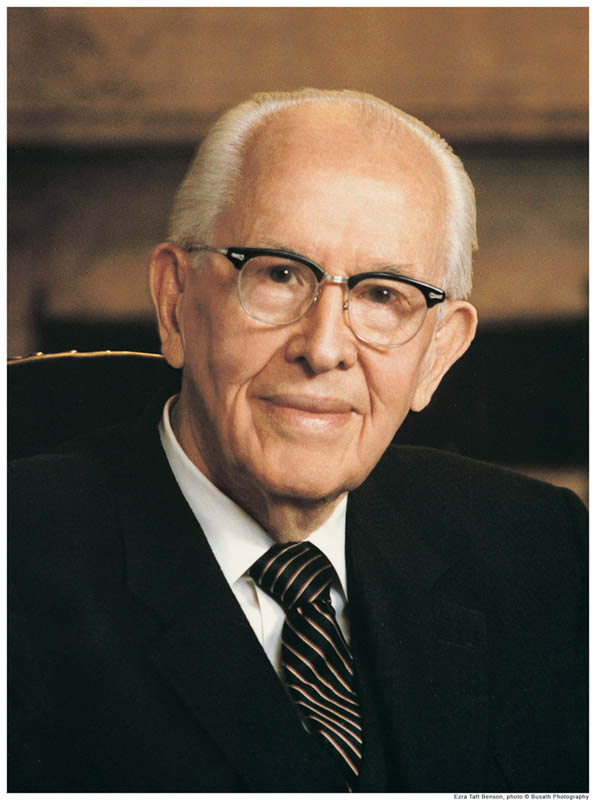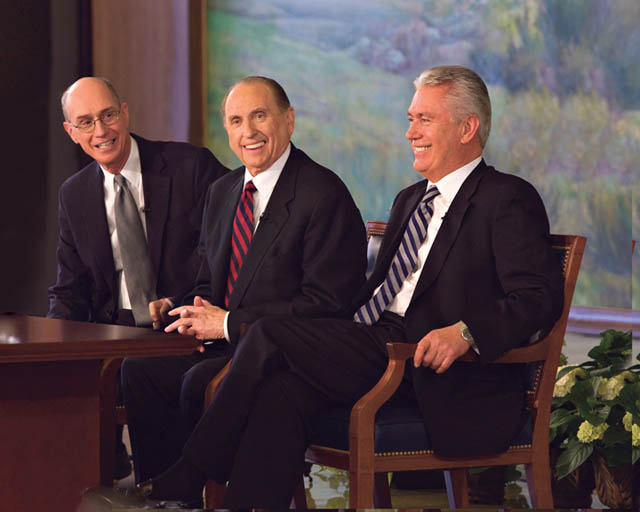This is the sixth installment in a series of articles on Mormon prophets. The series is based on a talk given by Ezra Taft Benson, who was then a Mormon apostle. In the article, he outlines Fourteen Fundamentals in Following the Prophet.
The fifth principle Elder Benson teaches is: The prophet is not required to have any particular earthly training or diplomas to speak on any subject or act on any matter at any time.
Many churches require their religious leaders to have a degree from a ministerial program. However, the Mormons are a lay church. No one sets out to become the Mormon prophet or even the bishop. Positions are filled without pay. Except at the highest levels, the positions are normally held for a small number of years. Apostles retain their positions for life once called (chosen.)
Because a person does not know in advance he might be a prophet, his preparation for the job is the same as any other Mormon’s preparation for a calling.
A calling is a church job. Mormon beliefs teach that when we have a position to fill, we should decide whom we would like in the position and then pray for confirmation from God. It may be that God has one specific person in mind for the calling or it may be that a number of people could benefit from it, but either way, we are to seek his confirmation on our choice.
Mormons are not promoted in a traditional sense. A person can be the president of the Sunday School one year and a teacher’s aid in the Sunday School the next year. He hasn’t been demoted; he just has a different job this time.
A prophet prepares for his calling as a prophet in the same way any other church member prepares. He attends his church classes, studies the scriptures privately and as a family, and spends time pondering what he learns. He improves in his ability to live the teachings of Jesus Christ and he shares what he learns with others.
By having served in a variety of church jobs, he gains new talents and skills and learns to see the gospel from a variety of viewpoints. Each time he serves in a new position, he learns to understand that auxiliary or quorum’s work. Each time he has a leadership position he gains new leadership skills. By sometimes returning to a position of non-leadership, he is reminded of how the world looks to those who are not in charge and to build on the skills needed to fulfill other types of jobs. Elder Benson explained:
“Sometimes there are those who feel their earthly knowledge on a certain subject is superior to the heavenly knowledge which God gives to his prophet on the same subject. They feel the prophet must have the same earthly credentials or training which they have had before they will accept anything the prophet has to say that might contradict their earthly schooling. How much earthly schooling did Joseph Smith have? Yet he gave revelations on all kinds of subjects. We haven’t yet had a prophet who earned a doctorate degree in any subject. We encourage earthly knowledge in many areas, but remember if there is ever a conflict between earthly knowledge and the words of the prophet, you stand with the prophet and you’ll be blessed and time will show you have done the right thing.”
Since prophets cannot do anything of their own choosing, but can only teach what God has already revealed, a degree is not necessary. What he must have is not an academic knowledge of religion, but a personal knowledge. He needs a testimony of God and Jesus Christ and experience living his religion and helping others to do so. Any other religious knowledge can be gained through personal study and attendance in church programs. Mormon doctrine is openly available to anyone willing to take the time to study and so any church member can gain the same knowledge and understanding of the Gospel of Jesus Christ as can a prophet.
“Amos tells us, “Surely the Lord God will do nothing, but he revealeth his secret unto his servants the prophets” (Amos 3:7). These are the prophetic oracles who have tuned in over the centuries to the “celestial transmitting station,” with a responsibility to relay the Lord’s word to others. The principal qualifications of a prophet in any age are not wealth, title, position, physical stature, scholarship, or intellectual attainment. The two qualifications are, first, a prophet must be called as such by God and ordained by one known to have legal and spiritual authority (see D&C 42:11), and second, he must receive and declare revelation from God. No man knows the ways of God except they be revealed unto him (see Jacob 4:8)” (James E. Faust, “Continuing Revelation,” Ensign, Aug 1996, 2).
As we study the Bible we can see the ancient prophets were seldom important or well-educated. They were seemingly ordinary men who had great faith in God and the ability to do God’s will even when it was difficult. Noah and Moses were not rabbis highly trained. They were just men God chose because He knew they would live according to God’s commands and would have—or would gain—the courage to do what needed to be done.
These early prophets had testimony of God and of the coming of Jesus Christ. Today, the most important duty of a prophet is to testify of Jesus Christ. Gordon B. Hinckley, the previous Mormon prophet explained, “I know that I am not the head of this Church. The Lord Jesus Christ is its head. My mission, my chief responsibility, my greatest honor comes in bearing solemn testimony of His living reality. Jesus Christ is the Son of God, who condescended to come into this world of misery, struggle, and pain, to touch men’s hearts for good, to teach the way of eternal life, and to give Himself as a sacrifice for the sins of all mankind. He is ‘King of Kings and Lord of Lords, and He shall reign forever and ever’ (Handel’s Messiah). … I bear solemn witness that He lives and stands on the right hand of His Father.”
Read the testimonies of Jesus Christ of each of the modern Mormon prophets prior to Thomas S. Monson.
Read one testimony of Jesus Christ from Thomas S. Monson, current Mormon prophet.
About Terrie Lynn Bittner
The late Terrie Lynn Bittner—beloved wife, mother, grandmother, and friend—was the author of two homeschooling books and numerous articles, including several that appeared in Latter-day Saint magazines. She became a member of the Church at the age of 17 and began sharing her faith online in 1992.







When President Monson was made Presiding High Priest, someone asked one of the younger general authorities if he agreed that President Monson was probably “out of touch,” and “under qualified to lead a religion.” The younger general authority responded, “You would probably assume that he would need to know about each of the programs of the church and possess leadership qualities and young energy to run this religion would you?” The man said yes. The last response was this, “The only qualification for a prophet is this: that he hear the voice of the Lord. President Monson has held the apostleship since his thirties. Can you imagine a more qualified man?”
I know that President Monson is the Lord’s representative to the world. I know that as we follow him we will be led to Christ.
(These are not direct quotes)